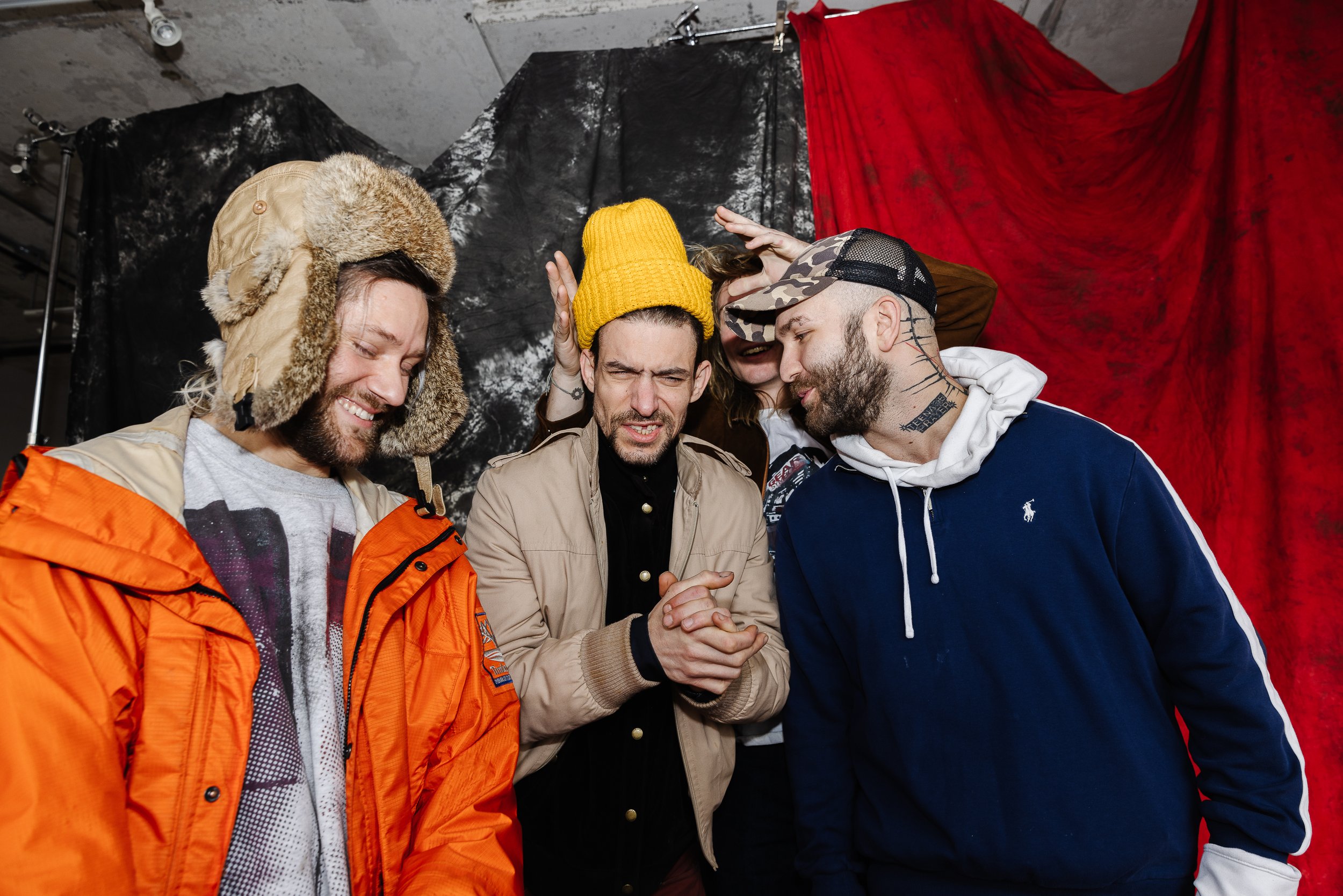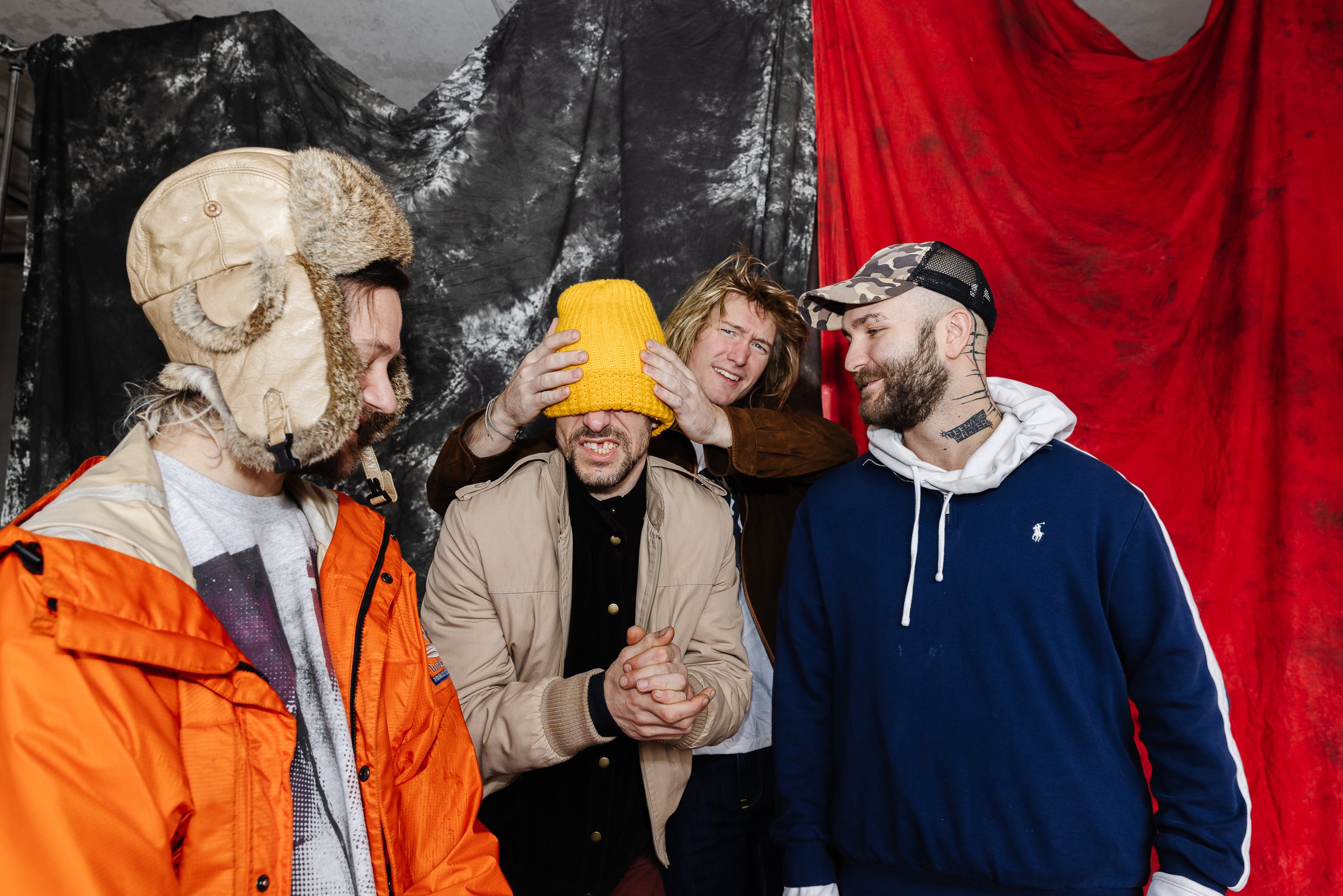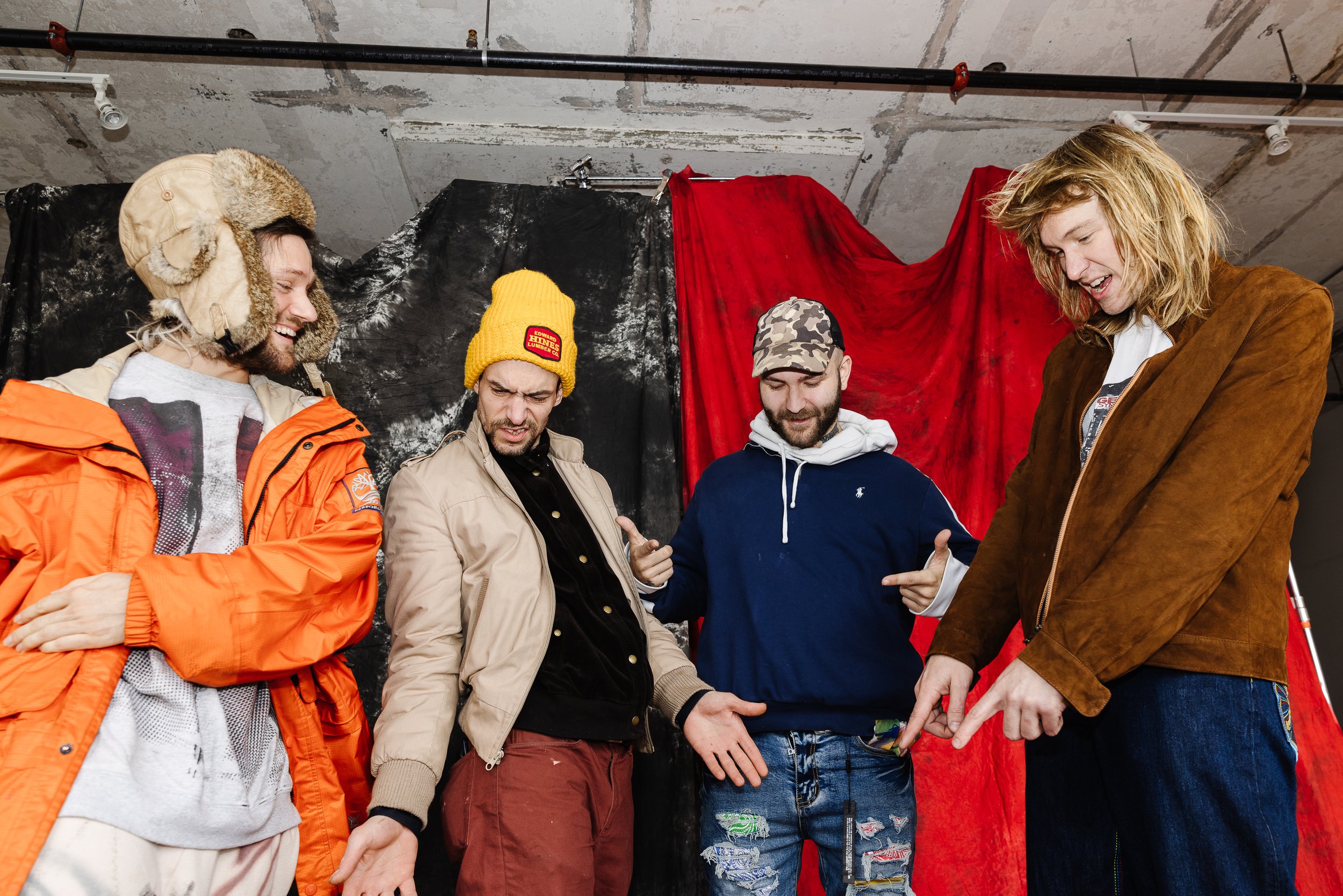Meet Local DIY Studio ‘Gear Symbol’
Photography by Michael Salisbury
Walking into Gear Symbol for the first time is a bit of a disorienting experience. The energy inside doesn’t match the relatively quiet street the studio sits on in the Chicago neighborhood of McKinley Park. Amongst the graffiti tagged walls and paint splattered floors laid abstract canvases, slabs of past projects, and various recycled materials. In its entirety, the aesthetics of the space seemed to align with the creation that occurs there.
Showing me around were founder Steve Matiasek and teammates Jimi Paszkiewicz, Christoper “V8” Pesch, and Crystal Currency. To them, Gear Symbol was never designed to be just a studio space. The logo itself, a small rotary gear, is a metaphor for the multiple cogs needed to keep a machine running. To support artistry, it takes a village. As an outlet for collaboration and artist empowerment, Gear Symbol provides burgeoning DIY artists with a coworking studio that converts into a gallery to show and sell the work created within their walls.
In our society, little support is offered to those pursuing occupations that aren’t blatantly profitable. Even in the upper echelons of the art world, the barrier of entry comes down to how recognizable your name is —a feat that often correlates to how monetarily valuable your work is. From painting to making music, pursuing any kind of art as a vocation requires the ability to withstand hundreds to thousands of pay-less hours. Persisting is tough. As a result, potentials are unmet and art is left unmade. Gear Symbol is looking to challenge this narrative by providing encouragement, community, and opportunity to young artists, giving them the foundation they need to continue creating.
By contributing to their Kickstarter, donors can sustain this ecosystem that uplifts DIY artists in Chicago. With these funds, Gear Symbol can expand to a larger location and recruit more artists for their collective. From design to video work to visual art, freelance artists that are open to working hard and propping up other members of the Chicago art community can find a home here. Read our interview with the team at Gear Symbol to find out more about their cause. Also, click the link below to donate to their Kickstarter. (https://www.kickstarter.com/projects/gearsymbols/gear-symbol-studio-needs-your-help).
How did Gear Symbol come into existence?
Jimi: So, me and Steve started working on art together four years ago. We had gotten a studio in Pilsen. Me, Steve, and a couple of our friends just were figuring out what we really wanted to do so we just started making art together. Steve had scanned a small gear he had gotten from his dad and we were like, “Damn, this is a pretty sick logo.” You know, for a big machine to operate, you need smaller pieces. All of us working together to complete one task is how we viewed it.
How would you describe this space?
Pesch: I like to call it the most New York scene in Chicago. This is the only place I’ll go where I would have to go to SoHo to see the stuff I see here. At the end of the day, when you come to the art show here, you’re probably going to see the youngest and hippest people that you’re going to be able to find anywhere.
Jimi: I would say we’re pretty much DIY artists.
Pesch: Yeah, but like, you’re going to get what you want. I’ve been finding myself selling more work through people that have a hard time finding the things they want. They’ll be on Instagram and see the abstract, museum shit and that’s not something you’ll usually find [in Chicago]. You know, I’ve been here my whole life, like, Chicago is not very high art. But, [Gear Symbol] is a good place to find those things, if you’re looking for more depth and more art.
Why should people donate to this kickstarter?
Pesch: I think people should donate to this Kickstarter because […] I find myself looking up to people half my age instead of twice my age. It’s really different out here for everybody that’s younger. The amount of money it takes to survive now while doing what you want. Like, I got away with so much shit when I was in my early twenties. It didn’t cost shit to live your life. You could do all of the things that people now wait to do later in life. [Young people] need help, [Gear Symbol] needs help, I still need help. There’s no endless amount that would ever satisfy unless you could pay for therapy like, three times a day. You know, these kids need it. Everybody needs help and everybody wants to grow larger. I want to build an orb made out of fucking steel, like 100 feet high. It’s realistic if you can get the funding.
Steve: People should donate money to this Kickstarter because it’s going to a good cause and it’s helping artists make more artwork that’s expressing themselves. I think that’s what the world needs. You should be able to believe in yourself, make things that you want to create, and not be put down by money because you can’t pay your rent and have to work a minimum wage job. I think everyone deserves the opportunity to be able to make whatever they want and express themselves through that as long as they are continuously creating. I don’t think that a lot of people understand that you can do that for yourself if you just believe in yourself enough to want to do it. To work hard enough for yourself and put in the hours in order to make that happen for yourself and the people around you.
I think that we have a group of people that are on the same page enough where we can all come together and make great things, not only by ourselves but together as a team. That’s when it shows the most just how great people really are. Working together and sacrificing your idea for somebody else’s and making it work is a very important part to life in general, you know? I think that we’ve kind of figured that out ourselves.
Jimi: I think that a lot of artists get really discouraged by other galleries or places that show artwork. [Gear Symbol] shows that with a core group of people, you can actually work together and work hard to have something made instead. We show people that you can do something and make it happen without these other places that kind of, keep their doors closed to the public.
Steve: I think we’re also creating a space where we’re giving artists the opportunity to show their work. We’re breaking the line between fine art and being a DIY artist. We can give people who we think are awesome and who we know work hard the opportunity to show their work, but if we give an even bigger platform, we can get more eyes on it and bring more people in. [Gear Symbol] can expose people to artists that are outside of the hard-to-access galleries.
That makes people believe in themselves because they can see that it’s possible and not that far out of reach. To me, when I tried to start showing my stuff in galleries, nobody was letting me in the door. I maybe got into one group show and I went to every single gallery in Chicago. I had great work and I spent thousands of hours on pieces and nobody would show anything I made. So that’s when I was like, “why don’t I just try to do this myself,” and bring in people who I think are amazing and do awesome stuff. My friends were making way rawer stuff than anything that hangs in these galleries.
Jimi: It’s like a popularity contest. If you don’t have a recognizable name, these galleries won’t want to work with you. Right now, we’re working with the bare minimum. But even with the bare minimum, everything we’re making is pretty amazing. Imagine if we just had a little help and what could be made with extra hands.
Pesch: Yes, we need more space. We want to get out of here and get a larger space to just work in and then use other galleries to install. Then we can come in with a greater purpose.
What role do you think the Chicago and Mckinley Park community play in your artistry?
Jimi: I think Chicago is a pretty big inspiration, like the bridges and overall industrial-type of aesthetic. I think McKinley Park is just where we happen to be. There are a lot of warehouses and factories here. You can just look around and find inspiration within a block radius.
Crystal: Yeah, and I’ve lived here my whole life. No one here really associated this area with art. Everyone here is super hard working and has to make a living for their family and stuff. So, when I found this place, I was so surprised because it’s like a culture hub for people from the South Side. They can meet here to create things, it’s really nice.



